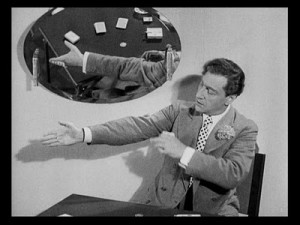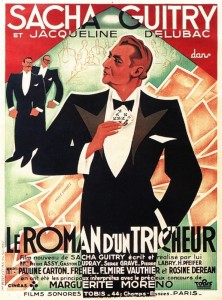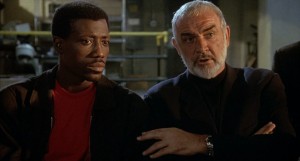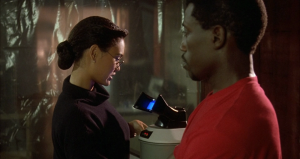From the Chicago Reader (May 1, 1993). — J.R.

Aiming successfully for a wider audience in 1961, the neglected French independent Jean-Pierre Melville (Les enfants terribles, Le samourai) adapted Beatrix Beck’s autobiographical novel, set in a French village during World War II, about a young woman falling in love with a handsome, radical young priest who’s fully aware of his power over her. For the starring roles Melville, godfather of the New Wave, ironically selected two talented actors catapulted to fame by that movement — Hiroshima, mon amour‘s Emmanuele Riva and Breathless‘s Jean-Paul Belmondo. The poetic results are literary and personal; the heroine’s offscreen narration suggests the pre-Bressonian form of Melville’s first feature, Le silence de la mer, and sudden subjective shots convey the woman’s physical proximity to the priest as she undergoes an ambiguous religious conversion. Not an unqualified success, the film remains strong for its performances, its inventive editing and framing, and its evocative rendering of the French occupation. According to Melville, the film ran for 193 minutes in its prerelease form; he edited out 65 minutes, and another 18 minutes are missing from the present version. The eclectic and resourceful nonjazz score is by jazz pianist Martial Solal. Read more
From the November 1, 1993 Chicago Reader. — J.R.

Widely regarded as Sacha Guitry’s masterpiece (though I’d place it below The Pearls of the Crown), this 1936 tour de force can be regarded as a kind of concerto for the writer-director-performer’s special brand of brittle cleverness. After a credits sequence that introduces us to the film’s cast and crew, Guitry settles into a flashback account of how the title hero learned to benefit from cheating over the course of his life. A notoriously anticinematic cineaste whose first love was theater, Guitry nevertheless had a flair for cinematic high jinks when it came to adapting his plays (or in this case a novel) to film, and most of this movie registers as a rather lively and stylishly inventive silent film, with Guitry’s character serving as offscreen lecturer. Francois Truffaut was sufficiently impressed to dub Guitry a French brother of Lubitsch, though Guitry clearly differs from this master of continental romance in that his own personality invariably overwhelms his characters. In French with subtitles. 85 min. (JR)
 Read more
Read more
From the Chicago Reader (July 1, 1993). — J.R.


Some of my colleagues criticized this Philip Kaufman cop movie for softening the anti-Japanese feeling of the Michael Crichton novel it adapts — for coming down on corporate capitalism in general more than Japanese capitalism in particular, and diluting or at least complicating the racial implications by making the principal hero black instead of white. But I found it pretty entertaining, as well as provocative in some of its comments about contemporary life. Just about everyone — including Wesley Snipes and Sean Connery as a couple of LA cops uncovering a business conspiracy while investigating a murder — turns out to be somewhat corrupt, and the Connery character’s pithy explanations for the cultural and behavioral differences between the Japanese and American characters help to ameliorate some of the traces of xenophobia that remain. I’d rather see Kaufman upgrading the hackwork of Crichton than degrading the good work of Don Siegel (Invasion of the Body Snatchers) or Milan Kundera (The Unbearable Lightness of Being). While most of the opportunities to make this a first-rate thriller are wasted, it’s still a pretty good second-rater. Written by Kaufman, Crichton, and Michael Backes; with Harvey Keitel, Cary-Horoyuki Tagawa, Mako, Ray Wise, and Tia Carrere. Read more





